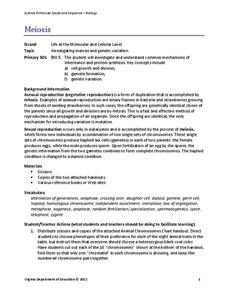Curated OER
How Do Organisms Reproduce
Students examine the difference between mitosis and meiosis, and describe the steps involved in meiosis and the significance of each step. They create a diploid nucleus containing two pairs of chromosomes using clay.
Curated OER
Born of Blood
Students define attributes of human chromosomes and match them to make a human karyotype. In this investigative instructional activity students demonstrate how traits are encoded in genes found on chromosomes.
Curated OER
Meiosis
Using yarn and chenille stems, lab groups collaborate to model mitosis and meiosis. Brief background information and a vaguely written procedure comprise this outline. More instruction needs to be provided to learners about cell division...
Curated OER
Dragon Genetics Lab-Principles of Mendelian Genetics
Students study genetic traits using popsicle sticks as chromosomes. In this biology lesson, students explain how traits are inherited from parents. They differentiate dominant and recessive genes.
Curated OER
Gene Puzzles
Students come to understand that in sexually reproducing organisms, such as humans, typically half of the genes come from each parent.
Students examine a fictional pedigree and determine which gene is responsible for a given trait. The...
Curated OER
Where Are the Dinosaurs?
Students explore the concept of extinction by studying dinosaurs. In this dinosaur lesson, students distinguish between extinct creatures and those that still exist.
Curated OER
Modeling Mitosis and Meiosis
Young scholars construct and manipulate models of mitosis and meiosis and compare/contrast them. They create the models using index cards and yarn, interpret diagrams and photographs, and summarize written descriptions.
Curated OER
Lesson 10: Karyotypes
Learners predict traits of future offspring. In this biology lesson, students study karyotyping to predict genetic disorders. They research an assigned karyotype and present information about it.







